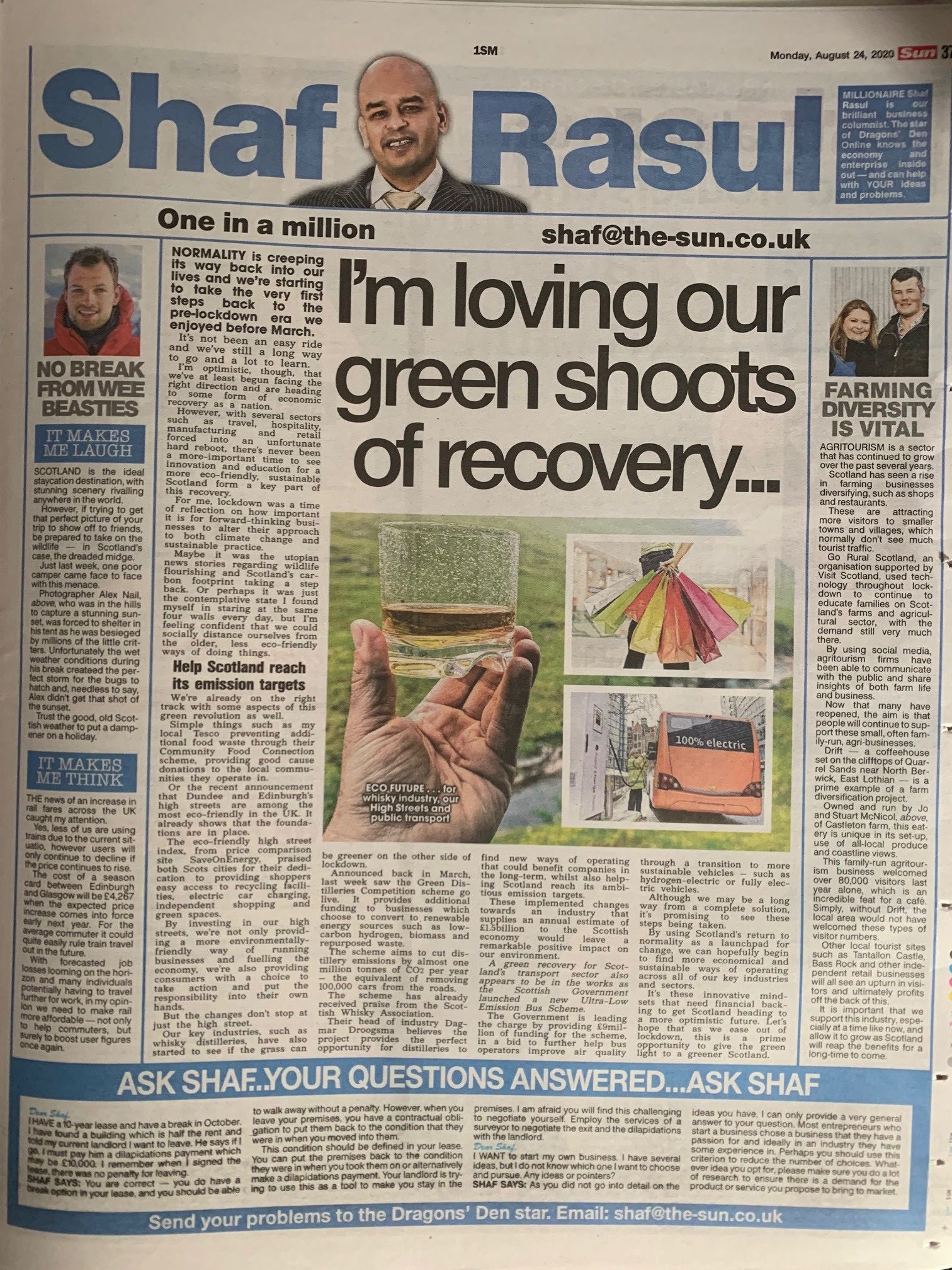Normality is slowly creeping its way back into our lives and we’re starting to take the very first steps back to a pre-lockdown era we enjoyed back in January.
It’s not been an easy ride and we’ve still a long way to go and a lot to learn, but I’m optimistic that we’ve at least begun facing the right direction and are heading to some form of economic recovery as a nation.
However, with several sectors such as travel, hospitality, manufacturing and retail forced into an unfortunate hard reboot, there’s never been a more important time to see innovation and education for a more eco-friendly, sustainable Scotland form a key part of this recovery.
Lockdown was a time of reflection for me on how important it is for forward thinking businesses to alter their approach to both climate change and sustainable practice.
Maybe it was the utopian news stories regarding wildlife flourishing and Scotland’s carbon footprint taking a step back, or perhaps it was just the contemplative state I found myself in staring at the same four walls every day during lockdown, but I’m feeling confident that we could socially distance ourselves from the older, less eco-friendly ways of doing things.
We’re already on the right track with some aspects of this green revolution as well. Simple things such as my local Tesco preventing additional food waste through their Community Food Connection scheme, or the recent announcement that Dundee and Edinburgh’s high streets are among the most eco-friendly high streets in the UK. It already shows that the foundations are in place.
The eco-friendly high street index, from price comparison site SaveOnEnergy, praised both high streets for their dedication to providing shoppers easy access to recycling facilities, electric car charging, independent shopping and green spaces.
By investing in our high streets, we’re not only providing a more environmentally friendly way of running businesses and fuelling the economy, we’re also giving consumers a choice to take action – something 2020 has already proven is vital.
But the changes don’t stop at the high street. Key industries, such as Scottish whisky distilleries, have also started to see if the grass can be greener on the other side of lockdown.
The Green Distilleries Competition scheme, which launched last week, will provide funding for businesses that convert to renewable energy sources such as low-carbon hydrogen, biomass and repurposed waste.
The scheme aims to cut distillery emissions by nearly one million tonnes of CO₂ annually – equivalent to taking 100,000 cars off the road.
The Scottish Whisky Association has praised the move, and rightly so. Head of industry Dagmar Droogsma sees the project as a chance for long-term gain, with distilleries both supporting Scotland’s emissions targets and benefiting operationally in the process.
With whisky contributing £1.5 billion to our economy annually, these changes could have huge positive impact.
Meanwhile, a green recovery for Scotland’s transport sector is also in the works, with the Scottish Government launching its Ultra-Low Emission Bus Scheme, backed by £9 million in funding. The aim? To help bus operators adopt hydrogen-electric or fully electric vehicles and clean up our air quality.
Much like the pandemic, we may be a long way from a full solution, but these early steps are promising.
If we use Scotland’s return to normality as a launchpad for sustainable innovation, there’s real hope we’ll see positive long-term results. Let’s give the green light to a greener Scotland.
Agri-tourism Holds Its Ground
Agritourism is a sector that has continued to grow over the past several years, and despite what 2020 has thrown at the Scottish economy, this doesn’t look to change.
Scotland has seen a rise in farming businesses diversifying – think farm shops and dining destinations – popping up in rural areas and attracting more visitors to lesser-travelled towns and villages.
Go Rural Scotland, supported by VisitScotland, smartly used digital platforms during lockdown to engage families with farming and the wider agricultural sector.
By embracing social media, agritourism businesses shared insights into farm life, built connections, and stayed top-of-mind even when visits weren’t possible.
Now that these businesses are reopening, the hope is that support continues, particularly for the smaller, family-run ventures.
Drift, a café perched on the clifftops of Quarrel Sands near North Berwick, is a great example of rural diversification done well. Owned by Jo and Stuart McNicol of Castleton Farm, it’s known for its stunning views and focus on Scottish produce – drawing 80,000 visitors last year.
It’s the sort of enterprise that not only benefits directly but brings extra footfall to neighbouring tourist sites and local shops.
The message is clear – supporting agri-business isn’t just good for the rural economy; it helps communities and Scottish tourism thrive long-term.
It Made Me Laugh
Scotland is the ideal staycation destination, with scenery to rival anywhere in the world.
But be warned – when you head into the hills, the real wildlife threat might not be the deer or the midges.
Just ask photographer Alex Nail, who found himself under siege by a swarm of midges during a camping trip to catch a sunset photo. He ended up trapped in his tent, battling thousands of the tiny pests.
The weather may have disappointed him – and so did the midges – but that’s just part of the joy of Scottish outdoor life. Always expect the unexpected.
It Made Me Weep
News of another rail fare hike certainly stopped me in my tracks.
It’s true that fewer people are travelling by train right now, but surely this is the time to make train travel more affordable, not less.
The expected rise will take the price of a season ticket between Glasgow and Edinburgh to over £4,200 – an eyewatering figure for the average commuter.
As we look ahead to job losses and more people travelling further to find work, affordable transport is essential. This increase could make rail travel unaffordable for many and set back greener commuting goals in the process.


